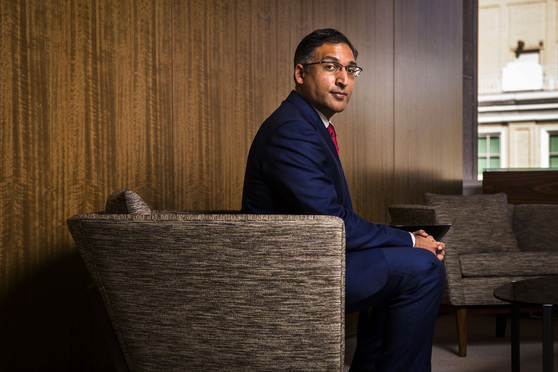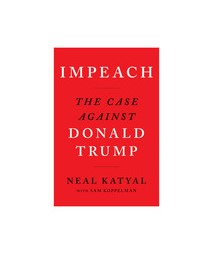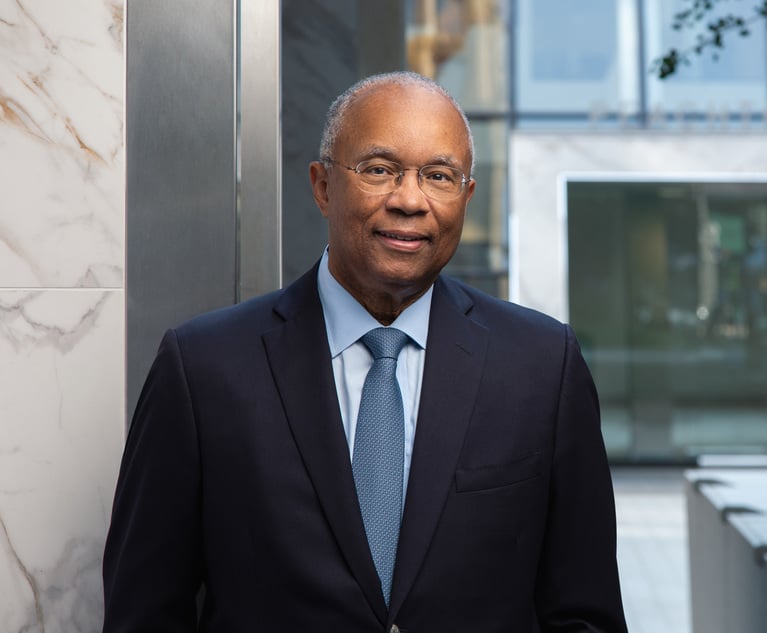'I Get Very Little Sleep': Neal Katyal on Juggling Oral Arguments, a Book, TV and '100%' Diversity
The Hogan Lovells appellate ace spoke with the NLJ's Tony Mauro about balancing everything from a book to billable hours.
February 27, 2020 at 11:40 PM
7 minute read
 Neal Katyal, partner with Hogan Lovells in Washington, D.C. October 30, 2017.
Neal Katyal, partner with Hogan Lovells in Washington, D.C. October 30, 2017.
Neal Katyal has been crazy busy lately, writing op-eds, fielding broadcast interviews and even writing a timely book about impeachment. And oh yes, he also argued U.S. Supreme Court cases in both December and January.
But Katyal, a partner at Hogan Lovells and former acting U.S. solicitor general, really wanted to talk about something else in a recent interview with The National Law Journal: his hiring of "100% diverse" associates in recent months, meaning lawyers of color, and women and LGBT associates. For Katyal, who has argued more Supreme Court cases than any other minority lawyer in history, that achievement is especially meaningful, and he hopes other firms will do the same.
Katyal spoke with NLJ's Tony Mauro about diverse hiring as well as his life as a high-profile attorney in the fast-moving impeachment drama. The interview took place on the eve of Allverse, Hogan Lovells' U.S. Minority & LGBT+ Lawyer Diversity Conference in Washington, D.C., a closed-to-the-press event that brought together 280 participants, including diverse Hogan Lovells lawyers, business service professionals and clients.
This conversation has been edited for length and clarity.
Who are your diverse new associates?
You and I first talked about Supreme Court clerk diversity in 1997 or 1998 and it's always been a concern of mine. So we've made it a real priority to try and find diverse, awesome associates. This year we have a class of entering associates that's 100% diverse. We have [Jo-Ann] Sagar who is an African American, Asian American woman who worked for then-Judge Brett Kavanaugh on the D.C. Circuit, and then for Justice Stephen Breyer on the Supreme Court. And we have Sundeep Iyer, who also clerked at the circuit court for Kavanaugh and on the Supreme Court for Breyer. We have Danielle Stempel, who clerked for Judge Thomas Griffith on the D.C. Circuit; and then we have Reedy Swanson, a gay man who clerked for Judge David Tatel on the D.C. Circuit. One of the things that I've been thinking a lot about over the last couple of years is gay attorneys arguing [before] the court. That, to me, is a real priority. Mitch Reich, one of the new associates I hired three years ago, argued a Supreme Court case in December. He was the first openly gay president of the Harvard Law Review. We're only one firm. We can only do so much, but we're trying to do what we can.
Are clients a factor in barriers to appellate or SCOTUS bar diversity?
I have to say the client side is really lovely. I work with any number of in-house counsel. We say we want you to bring our diverse associates, to rise. Merck, Google, Facebook in particular. Just this year all have said to me, at a very high level from their internal folks, "Hey, this is really important." The problem is, I suspect one thing is most clients tend to be pretty happy when you put a former Supreme Court clerk on a case. And they often don't look past that. There are exceptions like that from other companies I just mentioned. That's one barrier that we face; even if there is some client attention to diversity, it's often dissipated with some other merit badge. And for me, what that means in practice is, particularly at the Supreme Court level, the bar tends to look pretty similar year to year.
And the clients probably want you to represent them. Do you have to tell them that these other folks are good?
Certainly that happens sometimes. The bankruptcy case that Mitch argued in December is a really good example in which the client came to me first. But when they started working with Mitch, I said to them, "Hey, there's going to be one of the few times in history an openly gay man is going to argue a Supreme court case." That was interesting to the client. I don't mean to be monolithic about this at all, but you've got to make the ask. And even I could do better on that. I'm just learning how to make that ask.
In recruiting diverse lawyers, has it helped that you've been involved in the impeachment drama and are a very high-profile person?
Everyone obviously has been interested in it. I don't think that matters as much on the recruiting side. I want to make sure everyone knows that I'm working a crazy number of billable hours and they shouldn't think that I am slacking. So that's important. But other than that, I don't feel like that itself is much of a matter one way or the other. I think it matters what the composition of the group is. Our group historically has always been half women and a number of racial minorities, so I think that with that history and that current number, it's easier I suspect for a diverse attorney to join our group than maybe some others.
So how do you juggle your day job, all the media appearances you've made and the op-eds?
Well, I get very little sleep, but I've limited myself. I made a commitment, more than a year ago, that I wouldn't spend more than three hours a week on impeachment or on [President Donald] Trump. I felt I had to do that because I feel an obligation as a member of the bar to call the president out on this stuff. But at the same time, it's always been really important to me that the practice comes first. So, outside of some of the hearings, I maintained the three-hour-a-week rule. It's been pretty simple because I have an arrangement where the camera comes right to my house. It takes me 15 minutes total, start to finish, to do a hit on the news.
How did your "Impeach" book come about?
 Impeach: The Case Against Donald Trump, by Neal Katyal.
Impeach: The Case Against Donald Trump, by Neal Katyal.I wrote an op-ed with George Conway within a few hours of the first news of the whistleblower, in which we said we thought it may lead to Trump's impeachment. A couple of weeks later, I was sitting with my friends at dinner and one of them suggested writing a quick book.
I told them I didn't think I had the time, but I then realized I had a great collaborator in Sam Koppelman. I met Sam because I was asked to give the commencement speech at my alma mater, Yale Law School, this past year, and after 67 drafts, sent it to my friend Brian Koppelman, who writes [for] the show "Billions." Brian, in turn, said I had to give it to his son Sam and I am so glad I did. He is a brilliant writer, and so we were able to get the whole book done in two weeks, and every single one of those days I was able to bill at least eight hours too!
This content has been archived. It is available through our partners, LexisNexis® and Bloomberg Law.
To view this content, please continue to their sites.
Not a Lexis Subscriber?
Subscribe Now
Not a Bloomberg Law Subscriber?
Subscribe Now
NOT FOR REPRINT
© 2025 ALM Global, LLC, All Rights Reserved. Request academic re-use from www.copyright.com. All other uses, submit a request to [email protected]. For more information visit Asset & Logo Licensing.
You Might Like
View All
US Patent Innovators Can Look to International Trade Commission Enforcement for Protection, IP Lawyers Say

Zuckerman Spaeder Gets Ready to Move Offices in DC, Deploy AI Tools in 2025
5 minute read
Outgoing USPTO Director Kathi Vidal: ‘We All Want the Country to Be in a Better Place’
19 minute read
Ex-Deputy AG Trusts U.S. Legal System To Pull Country Through Times of Duress
7 minute readLaw Firms Mentioned
Trending Stories
Who Got The Work
J. Brugh Lower of Gibbons has entered an appearance for industrial equipment supplier Devco Corporation in a pending trademark infringement lawsuit. The suit, accusing the defendant of selling knock-off Graco products, was filed Dec. 18 in New Jersey District Court by Rivkin Radler on behalf of Graco Inc. and Graco Minnesota. The case, assigned to U.S. District Judge Zahid N. Quraishi, is 3:24-cv-11294, Graco Inc. et al v. Devco Corporation.
Who Got The Work
Rebecca Maller-Stein and Kent A. Yalowitz of Arnold & Porter Kaye Scholer have entered their appearances for Hanaco Venture Capital and its executives, Lior Prosor and David Frankel, in a pending securities lawsuit. The action, filed on Dec. 24 in New York Southern District Court by Zell, Aron & Co. on behalf of Goldeneye Advisors, accuses the defendants of negligently and fraudulently managing the plaintiff's $1 million investment. The case, assigned to U.S. District Judge Vernon S. Broderick, is 1:24-cv-09918, Goldeneye Advisors, LLC v. Hanaco Venture Capital, Ltd. et al.
Who Got The Work
Attorneys from A&O Shearman has stepped in as defense counsel for Toronto-Dominion Bank and other defendants in a pending securities class action. The suit, filed Dec. 11 in New York Southern District Court by Bleichmar Fonti & Auld, accuses the defendants of concealing the bank's 'pervasive' deficiencies in regards to its compliance with the Bank Secrecy Act and the quality of its anti-money laundering controls. The case, assigned to U.S. District Judge Arun Subramanian, is 1:24-cv-09445, Gonzalez v. The Toronto-Dominion Bank et al.
Who Got The Work
Crown Castle International, a Pennsylvania company providing shared communications infrastructure, has turned to Luke D. Wolf of Gordon Rees Scully Mansukhani to fend off a pending breach-of-contract lawsuit. The court action, filed Nov. 25 in Michigan Eastern District Court by Hooper Hathaway PC on behalf of The Town Residences LLC, accuses Crown Castle of failing to transfer approximately $30,000 in utility payments from T-Mobile in breach of a roof-top lease and assignment agreement. The case, assigned to U.S. District Judge Susan K. Declercq, is 2:24-cv-13131, The Town Residences LLC v. T-Mobile US, Inc. et al.
Who Got The Work
Wilfred P. Coronato and Daniel M. Schwartz of McCarter & English have stepped in as defense counsel to Electrolux Home Products Inc. in a pending product liability lawsuit. The court action, filed Nov. 26 in New York Eastern District Court by Poulos Lopiccolo PC and Nagel Rice LLP on behalf of David Stern, alleges that the defendant's refrigerators’ drawers and shelving repeatedly break and fall apart within months after purchase. The case, assigned to U.S. District Judge Joan M. Azrack, is 2:24-cv-08204, Stern v. Electrolux Home Products, Inc.
Featured Firms
Law Offices of Gary Martin Hays & Associates, P.C.
(470) 294-1674
Law Offices of Mark E. Salomone
(857) 444-6468
Smith & Hassler
(713) 739-1250










